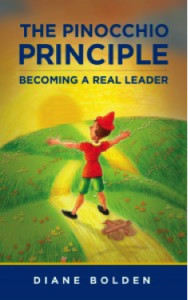Seven Powerful Lessons for Living that I Learned by Writing a Book
 Well, my new book, The Pinocchio Principle: Becoming a Real Leader finally went to print on Tuesday, 1/11/11. The process of writing has been a truly rewarding experience full of highs and lows and as intensely humbling as it has been exhilarating. As I’ve reflected back on some of the things I’ve learned along the way, I was struck by how applicable these lessons are to life in general. And, being a writer and a coach, I feel compelled to share them in the hopes that they will be of value to you — if only in some small way.
Well, my new book, The Pinocchio Principle: Becoming a Real Leader finally went to print on Tuesday, 1/11/11. The process of writing has been a truly rewarding experience full of highs and lows and as intensely humbling as it has been exhilarating. As I’ve reflected back on some of the things I’ve learned along the way, I was struck by how applicable these lessons are to life in general. And, being a writer and a coach, I feel compelled to share them in the hopes that they will be of value to you — if only in some small way.
Lesson #1: When you commit yourself to something that you want with all of your heart, a series of events is set into motion that allows you to get what you most need. However, some of these events may not necessarily be what you originally wanted.
The idea for writing The Pinocchio Principle floated into my head and onto a page in my journal almost six years ago. I dabbled at it – wrote a little here and there, sometimes in long spurts and other times in trickles. It went back and forth from my desk to my shelf again and again. In the latter part of 2009 I began to feel increasing frustration as I never seemed to have the uninterrupted blocks of time I needed to really concentrate and bring the book to life. Lo and behold, in the coming months I saw some of my largest coaching and consulting contracts come to an end. By January of 2010 my practice had become sizably reduced. I initially experienced frustration, disappointment and sadness. And then I realized that I had been given the gift of time and space. Three months later the first draft of manuscript was finished.
Lesson #2: Everything always takes longer than you think it will (note that it took another nine months for me to get from a first draft to a finished book).
This is actually a fairly well known adage called Hofstadter’s Law. Hofstadtler adds that his law holds even when you take into account Hofstadtler’s law. This is especially true when you are doing something you have never done before. You will not know what you don’t know. And mistakes will be made. If you beat yourself up for them, you will only prolong your suffering — and your delays. However, if you acknowledge and embrace these difficult lessons, you will move forward with far more confidence and lightness. You will also have a lot more fun. And so will everyone else who comes into contact with you and your work.
Lesson #3: Everything you do will be infused with whatever you are feeling when you do it.
Before I fully embraced lesson number two, I would try to power forward in spite of the fact that what I really needed to do was slow down. Anything I wrote in that state felt awkward, forced and completely devoid of the energy and passion I wanted to invoke. And I ultimately ended up having to rewrite those passages anyway. When I learned to reconnect with my intention of wanting my readers to feel uplifted and inspired, the words that fell onto the page came far more easily — and often in ways that uplifted and inspired me as well.
Pay attention to the energy you pour into the projects you work on. If you feel resentful or irritated as you go about your tasks, chances are the project will invoke those same feelings in everyone who comes into contact with it. Choose to infuse your work with love and positive intentions and see if people respond in a different way.
Lesson #4: The paradox of success is that only when you forget about yourself and your ego needs and focus on what you can give to others will you actually find what you seek.
As soon as I began to worry about what others might think of what I was writing (or of me), my writing fell apart. It was as though my left hand was writing while my right hand was grabbing hold of my wrist and keeping it from moving the pen across the page. I became too wrapped up in my own self image and needing to look good, which completely disconnected me from my true purpose. And as a result, the inspiration came to a complete halt. However, as soon as I became conscious of these egocentric thoughts and deliberately refocused myself on wanting to deliver something that would truly help my readers, I was able to get back into the flow.
I believe the same is true with anything we do. As soon as we worry about what others will think of us, we fall flat on our faces and end up experiencing the very things we most fear. When we shift our focus from what we can get to what we can give, we have a far more fulfilling experience — and so does everyone else.
Lesson #5: There is power in partnership.
I couldn’t have written this book without the aid of an unbelievable number of people who may not realize how invaluable their assistance really was. My coach helped me recognize the pitfalls I was stumbling into and guided me gently back onto my path. My editor reworded sentences to make the ideas to become crisper, clearer and more engaging. My husband and a number of clients and friends were kind enough to read passages of my manuscript and give me feedback, and the more eyes I had viewing the pages, the better the work became. Friends who had written their own books shared sage advice that guided me along my path. My designer showed amazing patience as I continue to revise cover after cover. Just as, if not more powerful than help in the mechanics of putting the book together was the support, love and encouragement I constantly felt from everyone along the way. Sometimes just talking through a concept helped me realize what I really needed to say and allowed me to more clearly articulate myself.
If you don’t have people around you who can be a sounding board, a coach, a mentor, a cheerleader – even a shoulder to cry on at times, I highly encourage you to seek people out who can support you in this way and rely on them often.
Lesson #6: Whenever you ask a question, you gain access to the answers you seek.
I actually wrote about this process in The Pinocchio Principle. Whatever you focus your attention on becomes illuminated. If you focus your mind on a question, you will find that the answers you seek begin to appear in various ways, often repetitively. They may come in the form of signs, information that you happen to come across, conversations you find yourself in, and even images that enter your mind. But you must pay attention in order to discern these answers, or you may miss them.
Some of the questions I held in my mind as I wrote The Pinocchio Principle included the following:
- How do you breathe life back into work and truly tap your highest potential? And how can you help others to do the same?
- How can you be who you really are (and succeed) in a world that seems to want you to be someone else?
- How can you successfully navigate through uncertainty (and help others to do the same) when everything around you seems to be falling apart?
- How do you tap into your creativity and inner wisdom in such a way that you are able to find the answers you most need at any moment?
The act of writing The Pinocchio Principle allowed me to find the answers I was seeking in such a way that I realized in the end my truest reward was simply having written it —regardless of whether anyone actually purchased a copy or not.
Lesson #7: Every dream worth pursuing will require you to go beyond what you believe to be your limits and push you out of your comfort zone.
There will be times when you question whether you really have what it takes to succeed. You will have days where you feel as though the work you do comes easily and carries you away in a flow of its own. And you will also have days where you will (literally or figuratively) sit and stare catatonically, immersed in the feeling of being completely, utterly stuck.
I have always believed that we are never given more than we are able to handle. The discovery I made in this process is that sometimes you have to be pushed to your edge to realize just how much you are actually capable of. The frustration, anxiety and doubt eventually do pass, but you may have to sit with them for awhile before they leave. They are like clouds that temporarily block the sun and cast shadows everywhere you look, only to help you better appreciate the bright beautiful light of day that was really there all along.
Click here if you’d like to order a copy of The Pinocchio Principle, or go to www.PinocchioPrinciple.com for more information.
Become a subscriber at www.DianeBolden.com and receive my free report: Ten Traps Leaders Unwittingly Set for Themselves…and How to Avoid Them.
Though comments are currently closed, please feel free to email me at Diane@DianeBolden.com with your feedback, questions and thoughts. Have a specific challenge you’d like to see a post written about? Let me know. I’d love to hear from you!

One thought on “Seven Powerful Lessons for Living that I Learned by Writing a Book”
Comments are closed.